Peter MALONE
Mercy Road
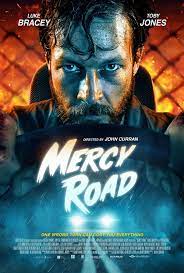
MERCY ROAD
Australia, 2023, 86 minutes, Colour.
Luke Bracey, voice of: Toby Jones.
Directed by John Curran.
On Mercy Road there is no mercy.
This is a very intense film, focusing on a man driving a car through the night, his momentarily getting out of the car, but the camera inside the car, focusing on the man, on the dashboard, on his face, on the continued phone calls and his responses. He is played, even more intensely, by Australian actor with international career, Luke Bracey.
The audience has to pay attention, listening to the man and his sometimes confused outbursts, the range of phone calls he gets, commanding sum to be listened to, cancelling others. We gather that he has committed a crime, that a man, business connection, husband of his ex-wife, has been killed. But, his more frantic about the disappearance of his young daughter.
In the pounding score reinforces this frantic atmosphere, often desperate.
By contrast with the anxieties of the driver, there is the caller whose voice is very calm, controlling, giving advice, driving directions, information about his daughter, about the dead man, about the ex-wife, seemingly detached, called in to handle situations. And the voices that are British actor, Toby Jones.
Filming inside a car has been a test of many directors, an expert was a bus tourist Army from Iran. But, there was also the British drama, Locke, with Tom Hardy behind the wheel, and a desperate situation.
The phone calls heighten the tension. Apart from the calmly sinister voice of the mediator, there are phone calls from community services concerning the daughter, some contact with his ex-wife, and, somewhat out of the blue, business partners expecting him to turn up for work. They have a cumulative effect.
Some audiences may find this a drive to claustrophobic and intense. On the other hand, it is a bold experiment by American director, John Curran, Chappaquidik,, The Painted Veil, who spent some time in Australia and directed films like Praise and Tracks.
- The title, the location, the tone?
- Australian production, the Australian star, voices? Of the menacing voice of Toby Jones? The musical score? Tone, intensity?
- The situation, the father, searching for his daughter, relationship with his ex-wife, with her husband, the business deals, his contracts and commitments? The confrontation with the husband? The threat to his daughter?
- The film within the car, his momentary stepping outside the car, the camera within, the focus on the driver, his face, the spaces of the car? The phone? The intensity of the pace, the editing?
- The character of the driver, his background, favours, drinking, the broken marriage, his daughter, business partner? The crime, the murder, driving, getting away, the night?
- The voice, sinister, controlling, knowing everything about the driver, his daughter, statements of detachment? Being present in crises? Control? The psychological pressure, the conversations? Threats and menace yet calm? The directions, the turns, the destinations? The information about his wife, her husband, the death? The taking of the daughter?
- The intensity of pressure, the phone calls, his business associate expecting him to turn up, putting them off? The voice control, excepting calls, refusing calls? The social welfare calls, the information, the appeals? His wife? Her following his directions? Her fate?
- The buildup to saving his daughter, communication with his daughter, his crime, sense of guilt, defiance? Desperation?
Dear White People
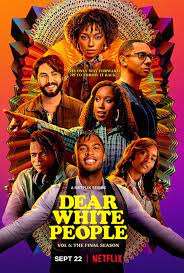
DEAR WHITE PEOPLE
US, 2014, 108 minutes, Colour.
Tyler James Williams, Tessa Thompson, Kyle Gallner, Tayonah Parris, Brandon P.Bell, Malcolm Barret or t, Dennis Haysbert.
Directed by Justin Simien.
A very successful satirical comedy from 2014, raising racial issues, African-American issues in a university context. The film was popular and led to the creation of a series with the same title, beginning in 2017, and employing the same writer-director, Justin Simien.
At the centre is Samantha, played by Tessa Thompson, who subsequently had a very successful career on television and in films, including Thor epics. The location is a rather Ivy League University campus, with veteran Dennis Haysbert playing the Dean.
Some critics have noted that most of the characters are narcissistic, ambitious. And this guides their interactions, writing and publishing, campus politics, campus relationships.
A film very much of its time in its characters and drama – but, the underlying themes, racial issues and tensions, continue.
- The title, the tone, the African-American perspective and attitude towards Caucasians?
- The campus setting, the Dean, official, office, management, staff, students?
- The University atmosphere, familiar from other campus films? The score?
- The accusation that the characters were narcissistic? The characters, ambitions, privilege?
- The focus on Samantha, personality, charm, intensity, her aims, interactions with Troy, breaking the relationship, the new boyfriend, Caucasian? Interactions with Lionel?
- Lionel, gay, shy, awkward, seemingly adrift in this world, interactions with African-Americans, with whites? Adopting styles, dress, hair?
- Troy, personality, relationship with Samantha, his ambitions? Her new boyfriend, Caucasian?
- The Dean, his stances, policies, economic situation, interactions with students?
- Campus elections, the politics, exercises of power and personalities?
- The party, its racist themes, parody?
- The film as a satire? The film as serious? The blend? The impact?
- An interpretation of African-American and race situations on campus, the 2010s? The end, and the different awareness of the different characters?
Out-Laws, The
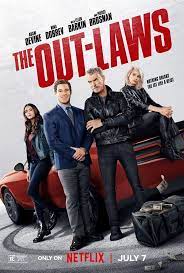
THE OUT-LAWS
US, 2023, 95 minutes, Colour.
Adam Devine, Pierce Brosnan, Ellen Barkin, Nina Dobrev, Michael Rooker, Poorna Jagannathan, Richard Kind, Julie Hagerty, Lauren Lapkus, Lil Rel Howery.
Directed by Tyler Spindel.
If Adam Sandler had been younger when this film was being made, he would have taken the central role. In fact, this comedy comes from his Happy Madison company and plays very much like one of his comedies.
Comedian Adam Devine takes Sandler’s place as Owen, pleasantly genial, bank manager, engaged to yoga instructor, Parker (Nina Dobrev.). He has very stuffy and suspicious parents, Richard Kind and Julie Hagerty. In fact, this film is noted for its star power, especially Pierce Brosnan and Ellen Barkin as the in-laws/out-laws, bank robbers. And Michael Rooker appears as the veteran FBI investigator.
So, there is some raucous comedy with the behaviour of the in-laws. And there are some serious tones with the in-laws/out-laws as the Ghost Bandits, bank robbers, teaming up with criminals, the effecting of a robbery, pursued by the FBI. Owen has his suspicions and confides them to his fiancee.
What happens is enjoyably complicated, giving information to the FBI and his being set up. However, criminals abducting his fiancee and demanding a ransom, his teaming up with the criminals for them to rob a bank mean twists. He hides in the vault, escapes, gets the money, returns to the vault. And the outlaws surrender.
Happy finale, the wedding, the in-laws able to come to the wedding – but Owen slipping a paperclip into their piece of cake for a further escape!
- The title, an amusing pun?
- From Adam Sandler’s company, tone, comic style, satire, broad comedy?
- The American town, homes, banks…? Musical score?
- The home situation, Owen and Parker, engaged, bank manager, yoga instructor, ordinary life? Owen as the young Adam Sandler style character?
- The preparation for the marriage, the prospect of the in-laws arriving, Parker happy, unhappy? Owen’s parents, their harsh attitudes, ignorance, criticisms of Parker? The dinner, Owen and the issues of storage, plans? Rehan and the criminal listening in?
- At work, the bank vault, the prank and freeing the victim, Owen’s help, knowledge?
- The arrival of the in-laws, calling themselves Lily and Billy, the star power of Pierce Brosnan and Ellen Barkin? Breezing in, no explanations, the day out with Owen, the tattooes, drinking, the skydiving?
- The bank robbery, Owen and the hangover, his noticing the clues, his growing suspicions about the Ghost Bandits?
- Oldham, the FBI agent, pursuing the Ghost Bandits, his intensity?
- Owen, his theories about his in-laws, confiding in Parker, her response?
- Rehan, the meetings with the in-laws, the deals?
- Owen, with Oldham, the truth, the set-ups?
- The criminals, the abduction of Parker, the demands?
- Owen, teaming with the in-laws, the discussions with Phoebe the bank manager, learning the details of the faults, the exits? His being locked in? The robbery, success, Owen escaping, yet getting the money, putting it back in the vault?
- The arrest, Oldham allowing the couple out for the wedding celebrations, the surrender – but Owen putting the paperclip in the cake?
200th Anniversary of the birth of Fr Jules Chevalier MSC - one month to go
200th Anniversary of the birth of Fr Jules Chevalier MSC - one month to go
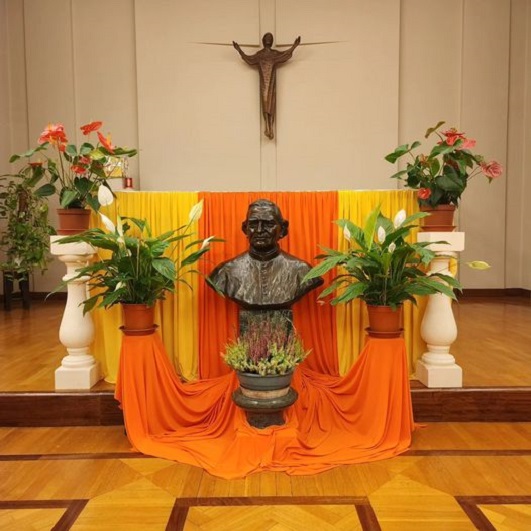
Stephen Hackett writes: You would be aware that the bicentennial anniversary of the birth of our Founder, Jules Chevalier, occurs on Friday 15 March this year. The Provincial Council discussed the anniversary at its last meeting in 2023 and decided that we should relate with the Daughters of Our Lady of the Sacred Heart, Missionary Sisters of the Sacred Heart, and Laity of the Chevalier Family to mark the occasion. Meeting with Sr Philippa Murphy FDNSC, Sr Tess Veenker MSC and Mr Fred Stubenrauch, we agreed that joint celebrations involving all branches of the Chevalier Family would be desirable wherever this is possible.
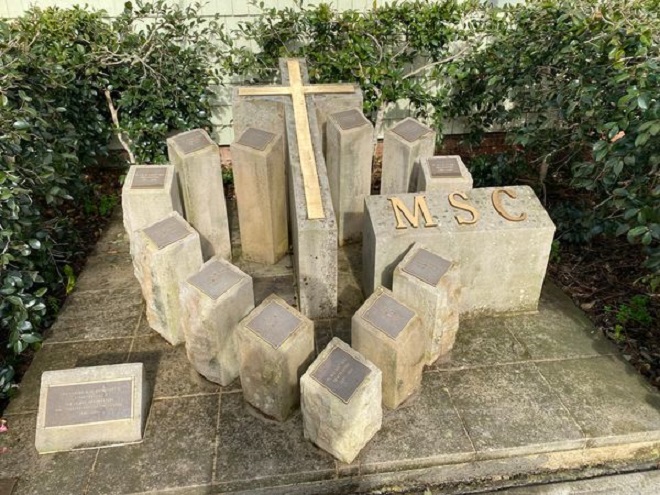
An extended form of Evening Prayer is being prepared and will be made available in early February. Each local community will be encouraged to celebrate this Evening Prayer at a suitable venue on Friday 15 March.
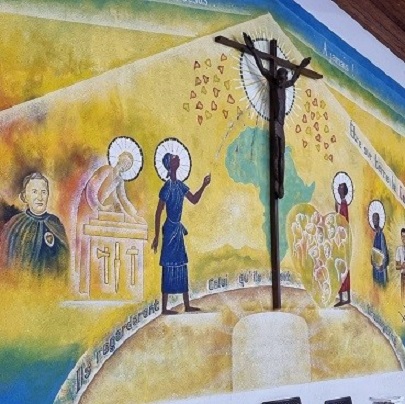
As well, to ensure senior members of the three congregations can participate in the celebrations, there will be morning Mass that day in Sydney and Melbourne. Invitations to these celebrations will be sent out next month.
The Melbourne Mass on March 15th in Melbourne will be the 10.00 am Mass at St Thomas, Blackburn, where we will all gather. (Note, the Novitiate begins at Blackburn on the evening of the 15th.)
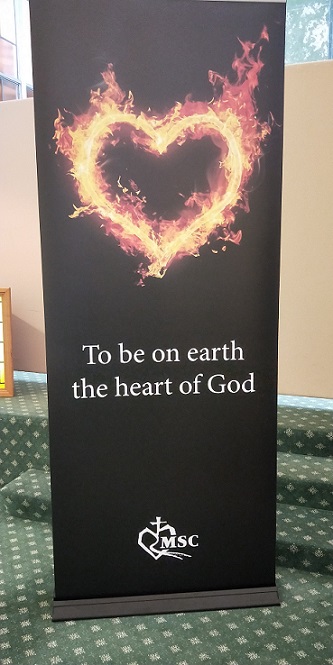
Lent – the Gospel practice of prayer, fasting, charity.
Lent – the Gospel practice of prayer, fasting, charity.

Jesus warns us against displaying our Lenten observance. We go into our inner rooms, our inner selves, deepen our inner love of God and neighbours wherever they are.
You might like and appreciate the challenges proposed by the Reverend Benjamin Cremer which we are sharing from the Facebook page of our US confrere, Jim Miller MSC.
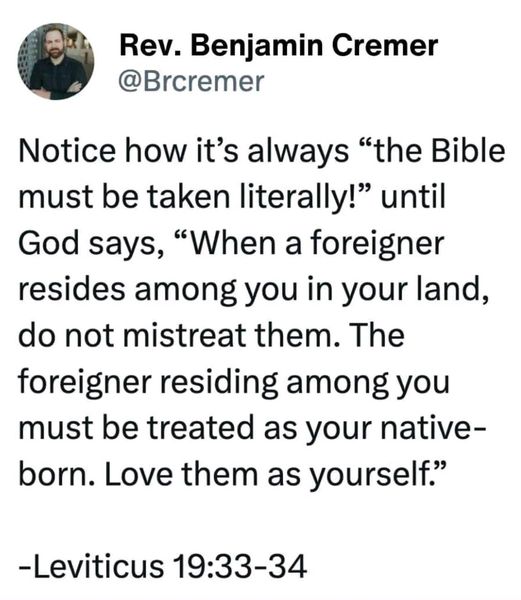
Rev. Benjamin Cremer has a weekly online newsletter called, "Into The Gray."

He says, ‘I have spent the majority of my life in Evangelical Christian spaces. I have experienced a lot of church hurt. I now write to explore topics that often are at the intersection of politics and Christianity. My desire is to discover how we can move away from Christian nationalism, religious fundamentalism, and church hurt to reclaim the Gospel of Jesus together.’
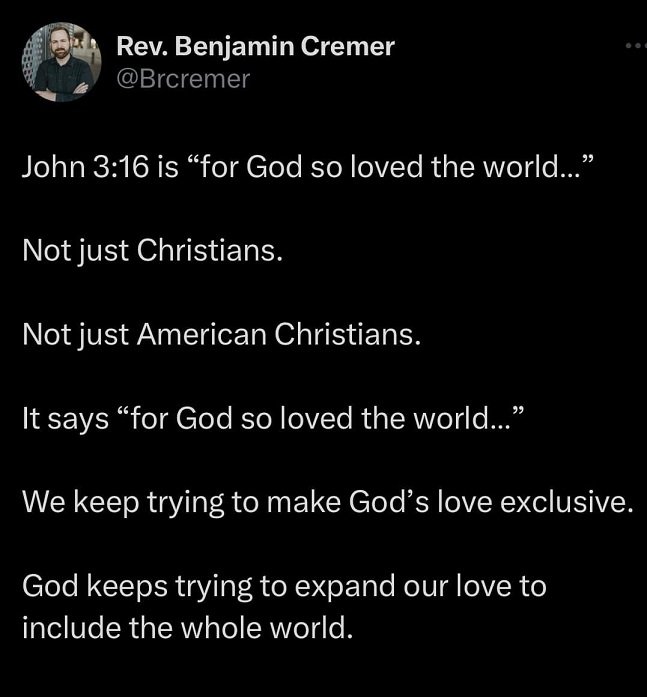
Ritual Killer, The
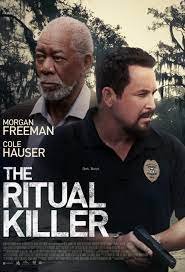
THE RITUAL KILLER
US, 2023, 92 minutes, Colour.
Morgan Freeman, Cole Hauser, Vernon Davis, Brian Kurlander, Giuseppe Zeno.
Directed by George Gallo.
The title sounds arresting for those who are interested in intriguing murder mysteries. And, with Morgan Freeman, perhaps memories of Seven.’
But, Seven it isn’t, and critical bloggers had a field day condemning the film.
However, it expectations aren’t high, there is an intriguing elements in this story, opening with scenes in Rome (and a geographically impossible chase highlighting well-known vistas), a gruesomely ritual killing, puzzle for the detectives. Then a transition to Mississippi, a detective, played by Cole Hauser, working with his partner, investigating another ritual murder.
The audience has seen the killer in close-up, played by Vernon Davis, former footballer. However, it is also shown that he is in the employee of a wealthy businessman in Mississippi, the Profesor at the University, Morgan Freeman, explaining to the detective about a particular gruesome ritual from Africa, killing a victim for a client, severing parts and sending them to the client who will devour them incorporating the qualities of the victim.
This builds up to a climax and a confrontation, especially with the help of the Professor. However, as might be suspected, there is a twist and a particularly gruesome ending highlighting the nature of the ritual – and its effect on the detective.
- Title and expectations? Murders? Grim murders? Grim killer? Investigations?
- The settings in Rome, aspects of the city? Dark streets, popular locations? The Mississippi locations, the city, the University, the police precincts, diners, wealthy mansion is? The musical score?
- The atmosphere in Rome, the police, the gruesome killing, the chase through the city, initial impressions of Randuko? The chase, his violence, the escape? His contact with Farner, his being available for murders?
- Mississippi, the police, the introduction to Boyd, is partner, the chief and his strident command, memories of his wife and daughters, deaths, blame?
- The murders, the scene in the bar, Randuko and his drinking, talking, the waitress, her talents, the threats, the violence, his escape?
- Boyd and his partner, the chases, tracking Randuko down, the pursuit, his apartment, the discovery of the aspects of his Muti religion?
- The introduction to the professor, his lecture, the students, theory about good and evil, different meanings, for example of medicine? His status at the University, migration from Lesotho, the visit of Boyd, the discussions, his initial unwillingness to help, change of heart, information about Muti? The employers, Farner, his motivations, the rituals, the choosing of victims, the use of limbs, posted to the clients, their eating the limbs, gaining power?
- Farner, Katie and the interview, Randuko present, taking her away, tying her up, the rituals?
- The research, finding the warehouse, interrupting the ritual, the confrontation between the professor and Randuko, his killing him? The rescue of Katie? Boyd and his motivations, his memories, and the attack on his partner and his visiting her in hospital?
- The contact with Rome, the detective, sharing of information?
- The finale, the disappearance of the professor, the package in Rome, the packaging Mississippi, Boyd opening it, the eyes of Randuko, and Boyd eating the eyes? Motivation? Fascination? To become a better seeing detective?
- In the final revelation about the role of the professor?
David Lynch The Art of Life
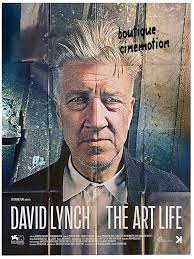
DAVID LYNCH: THE ART LIFE
US, 2016, 88 minutes, Colour.
Directed by Rick Barnes, Olivia Neergaard-Holm, Jon Nguyen.
David Lynch, celebrated film director, was born in 1946, grew up in the North Western states of Montana and Idaho, moving to Washington state, then various places including Virginia, moves to Philadelphia, then to Hollywood.
While this is a film for those who follow his films, it is a film for those interested in American art.
The only voice heard throughout the film is that of Lynch himself, the continued interviews spaced between the visuals. If it were transcribed, it would provide a text for an outline of Lynch’s early years, his growing up, relationship with his family, his appreciation of his parents and their challenges, his dislike of study, falling in with the wrong students, saved by art, celebrated artist giving him studio space, his developing his imagination and techniques, bizarre, expressionistic, full of colour. There are scenes of him throughout the film painting canvases, painting small pictures…
And, throughout the film, he is continually lighting up and smoking.
There is the family background, tribute to his mother encouraging his art, his praise of his father but his father visiting him, not liking his art, suggesting that he not have children… And, there is his relationship with his first wife, Peggy. And, throughout this film, there are sequences with his baby daughter, Luna.
Art students would be able to make comparisons with artists working, especially in the 1960s and 1970s. And, with his lessening interest in making films, focusing on short films in recent decades, there is his more contemporary art.
For those who follow his films, there would be disappointment in so far as the narrative goes only to 1976, his initial experimental film, and his making Eraserhead, its success, its effect on him, and his dedication to his own style of filmmaking. There is some background of his experimenting with film, juxtaposing colour and black-and-white, editing, being creative with lighting, staging, and with his actors.
The film was released in 2016. Since 2016, David Lynch has made no feature films.
Fool Me Once
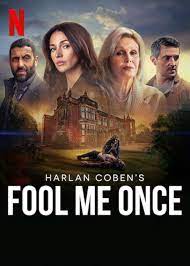
FOOL ME ONCE
UK/US, 2023, 8 x 50 minutes, Colour.
Michelle Keegan, Adeel Akhtar, Richard Armitage, Emmett J.Scanlon, Thea Taylor-Morgan, Marcus Garvey, Dino Fetscher, Joanna Lumley, Daniela Griver, Daniel Burt, Hattie Morahan, Natalie Anderson, Laurie Kynaston, James Northcote, Jade Anouka, Nicholas Farrell.
Directed by David Moore, Nimer Rashad.
From the 1990s, New Jersey writer, Harlan Coben, has been a bestseller author of crime and detection fiction. In more recent decades, he has become involved in television adaptations of his books, a substantial number of them being filmed in the US, but also in Britain and in Poland. Many of them have found streaming outlets, especially Netflix, and continued success for these adaptations.
This adaptation has a British setting, contrasting class, echoes of British involvement in wars in Iraq and Afghanistan, corporate mismanagement.
There are eight episodes and several strands of the story, all eventually coming together with some twists.
At the centre is Maya, Michelle Keegan, helicopter pilot on active service overseas, making a decision against orders which has resulted in the killing of civilians who had been judged as enemy. This has had an effect on her, continued nightmares, sense of guilt, regret. While in action, her sister has been killed in what seems like a burglary. Then, her husband, Joe (Richard Armitage) has been shot while in a park at night with his wife, two masked young bikies suspected.
On the one hand, this is the story of Maya, her devotion to her little girl, at home, kindergarten, memories of her husband. He belonged to a wealthy family, the matriarch played by Joanna Lumley in her Joanna Lumley style. Grandmother wants her granddaughter and is rather despising of her daughter-in-law. There are complications when a friend gives Maya a camera for security for the nanny and little daughter, but her husband appearing in the footage.
On the other hand, there is the story of the police inspector, played by a Adeel Akhtar (inspector Lestrade in the in Enola Holmes films). He has had tragedy in his life, fiancee killed in action, his drinking, her appearing to him, urging him to AA meetings which he neglects, but skilled in his work, in interrogations, given an assistant who talks too much, is a health crank, reveals himself as gay, but who contributes substantially to the investigation.
There is also the family of Maya’s dead sister, father Eddie (Marcus Garvey), two teenage children, who discover more about their mother, an early pregnancy, adoption, tracking down the father, their half brother – all conveniently local for the development of the plot.
And, there are a variety of suspects, a journalist whistleblower who had exposed Maya’s actions against the civilians, leading to his further investigations, contact with my sister, issues of the company run by the family (reminder of the opioid scandals and the Sackler family). There is a bullying football coach and his bikie son. There is also Maya’s sympathetic associate who helps her get information about various suspects.
The series gives full attention to each of the characters and develops aspects of their activities, involvement.
Ultimately, of course, there is an unexpected revelation for Maya, for the Inspector and his growing ill-health. And, a pleasing postscript, almost 18 years into the future.
- The popularity of Harlan Coben novels? Miniseries adaptations?
- The setting, the 2020s, flashback to the 1990s? The background of British war involvement, military sequences? The world of aristocratic and wealthy families? The world of international corporations? Chemicals? Echoes of the opioid families and scandals?
- The tone of the opening, the boys, hazing, sinister? The flashbacks? The final dramatising?
- The focus on the murder of Joe Burkert, the visualisation, being shot? The young masked men, bikes, in the park, suspects? The effect on Maya, memories of her marriage, flashbacks, her love for her daughter, care for her?
- The police investigation, Sami Kierce, his background, the death of his fiancee, his hallucinations with her, talk, companionship, going to AA meetings, his drinking? His grief, drinking, the effect on his health? Skill as a policeman? With superior officers? The Burkert case, Marty appointed, irritation with his talking, concerns about health? The bonding between the two, Marty and his mannerisms, yet efficiency? His confiding to Sami about his boyfriend? Sami’s health issues, the blackouts, the car crash, the dangers, Marty driving, concealed from the officials? Sami, the interrogations, his shrewdness, Maya, th all e Burkert family, Eddie and his family, the football coach, the episode with his son on the roof, his fall? Tracking down the accomplice in the park, the confession?
- Maya, strong personality, military, the war episode, her decision, the killing of civilians, her continued nightmares, Cory the Whistler, the expose, the mystery of the audio not revealed? Her working with Shane, as pilot and helicopter, his help, getting information, checking the bullet and the gun, his care for Lily, not being told the truth, his exasperation? Her telling him the truth?
- Judith Burkert, the Joanna Lumley type of aristocrat, her background, 40 years psychologist, her marriage, widowhood, the company, her relationship with her children, protecting them, the bribes to the captain of the yacht, suggesting Sami was taking bribes, Caroline and her mental health, Neil and his running of the busInezs, the death of Andrew, the murder of Joe? Her wanting to see her granddaughter? Manipulating, demanding, confronting Maya? The buildup to the final confrontation, her wanting to make a deal, admitting the truth about her children, Caroline and her shock, Neil and the gun and threats? The irony of the technology used to expose them?
- Maya, her devotion to her sister, memories of travels in France, the children fighting the photo of the pregnant Claire, Dan and his being an IT whiz, identifying the father, Abby going to see him, his shock? The irony of his identity, the past relationship, moving to the area for business, not knowing he had a son? Eddie coming and assaulting him? And his later helping him with the boy? The irony of finding the boy, the DNA tests, his being the coach assistant, his story, meetings with Claire, taking him to the fashionable school, this leading Claire to further investigations? The bonding within the family? Eddie, his drinking, grief, father, lack of self-confidence, his false alibi and the woman, justifying himself, and Maya writing him the letter to care for Lily?
- The football coach, bullying, Maya pulling his pants down, the reaction, the boy assistant? His son, on the bikes, their tracking him down, the pursuit, on the roof, his fall? His friend, Sami pursuing him, the truth?
- Cory the Whistler, the phone calls from Claire, Maya going to the club, tracking Cory down, his personality, journalist, expose, the truth about Claire and the information about the Burkert’s, her murder, his reaction? The investigation about the captain of the plot, his wife and Maya seeing her, the money bribes, the storage, Maya and Cory discovering the body, her calling the police, the pursuit and arrests? Cory and his secret headquarters, Sami and the pursuit? The extent that surveillance? The dangerous driving?
- The eventual relation of the truth, that Maya killed Joe, the issue with the gun and the bullets, the joke killed Claire, her revelations about the busInezs corruption? The background of Joe, the killing of the footballer, Maya and her visit to the mother of the boy, the story, going to the headmaster, threats of defunding, getting the truth? Joe, the flashback, the vodka and the dead boy, Andrew and his reactions on the yacht, Joe pushing him over?
- Judith, using the staff, the camera for security, digitalise in the image of Joe, Maya’s reaction, the babysitter assaulting her, Judith tracking them down, the confrontation, the truth, stranding them?
- Maya, and nightmares, issues of responsibility, forgiveness, her death wish, atonement? Laying the gun down, Neil and the gun, shooting her?
- 18 years later, Lilly giving birth, and in the family and their story, Sami and his son, calling the baby Maya?
Blast/ A Blast
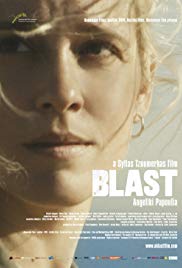
BLAST/A BLAST
Greece, 2014, 82 minutes, Colour.
Angelika Papoulia,Vassilis Doganis, Maria Filini, Themis Bazaka.
Directed by Syllas Tzoumerkas.
The central character, Maria, is in crisis. And this is how the structure of this film is created, moving from one aspect of Maria’s life to another, illustrating the breakdown.
The film was released with the background of the Greek financial crisis in the 2000s-2010s. In the background of the drama there are frequent television commentaries about the state of the nation, the state of finances. And, this is reflected in Maria’s life, the business company that her mother has managed and mismanaged, the interventions of her rather fascist brother-in-law, issues of money for herself and her arguments with authorities at the bank.
But, this is all happening on a personal level. Episodes in her life are presented piecemeal, requiring the audience to pick up on the meaning of each piece and the ability to place it in connection with others so that there is an overall portrait of Maria.
There is the young Maria, rowdy life, taking up with a sailor, marrying him at the age of 20, her children, his absences at sea, his passionate visits when he comes home from his ship. There are some quite graphic passionate sequences. However, we are shown that at sea, he becomes sexually involved with some of the men on his ship.
Maria, a student, well read, views on social issues, bonds with her sister. However, the financial difficulties with her brother-in-law – and her physical attack on him. Worse the conflicts with her wheelchair-bound mother, dominating her genial but weaker father. Maria has many conflicts with her mother, exposing her business deals, her mother then killing herself, the funeral sequence.
And, in the background, are environmental issues, sociological issues, and the information that a significant forest has been burnt. It would emerge by the end of the film, with the motivations, that Maria has chosen to set the fire, to challenge the authorities.
On a personal level, with the conflicts within her family, her decision to leave her husband, and to leave her children (after many sequences were shown with them), Maria drives speedily away – and with a death wish.
The film won awards at the film festival of Locarno and was shown extensively around the world at festivals.
As duas Irenes/ Two Irenes
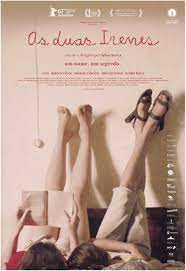
TWO IRENES/ AS DUAS IRENES
Brazil, 2017, 89 minutes, Colour.
Priscilla Bittencourt, Isabela Torres, Marco Ricca, Susana Ribeiro, ines Peisoto.
Directed by Fabio Meira.
This is a brief Brazilian film, set in the drylands of the country, focusing on two families.
The film opens with the first family, the patriarch at the head of the table, his wife, his daughters, including the 13-year-old Irene who is part of the family but also seems rather detached.
While the film establishes the atmosphere of this family, the love of the father, his dominant presence, the response of his wife, the different responses of the daughters, he is also absent from the family.
Irene then discovers that he has another family in the town, and a daughter, also called Irene, the same age. She ingratiate herself with the Irene in the town, their becoming friends, her finding a new lease of life, coming out of herself, a lot of shared experiences, the touch of the reckless, experimental. The two girls bond.
The audience observes the other family through the eyes of Irene.
Ultimately, there will have to be a confrontation with her father, the revelation of the truth, the effect on each of the families, on each of the mothers, on each of the Irenes.

